Children, Youth and Families Mental Health
The Mental Health Services Act (MHSA) funding is designed to expand and transform California's behavioral health system to better serve individuals with, and at risk of, serious mental health issues, and their families. MHSA addresses a broad continuum of prevention, early intervention, and service needs as well as the necessary infrastructure, technology, and training elements that effectively support the public behavioral health system. Through this funding CFCC provides program support and education on mental health issues to improve access to care, support, and case outcomes in California courts. Content is primarily intended for California court judges, court employees, and justice partner agencies, although some of resources and information on juvenile mental health may be of more general interest.
The Mental Health Youth Services Dashboard exclusively features publicly available data previously published by other California local and state government agencies. The Judicial Council of California is not the original source of data displayed on the dashboard.
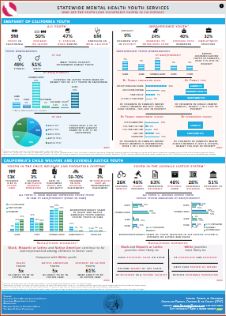 Mental Health Youth Services Infographics
Mental Health Youth Services Infographics
New! Updated November 2023 These infographics highlight demographics about California’s vulnerable youth and their mental health needs, the mental health services entitled to them, and gaps they face in accessing these services. This information can help judges and judicial system partners better see the environmental factors and social determinants affecting the long-term mental health of the youth and families that they serve. This, in turn, can inform decisions on which services youth and their families are referred to. Data displayed in these infographics is sourced from publicly available datasets from various local and state agencies and organizations.
To view all the infographics, click here.
To view the text version of these infographics, click here.
To view the infographics individually, click here.
We would love to hear your feedback about how helpful these infographics are. Please fill out a short survey here.
Created and maintained by Safia Belayadi from the Judicial Council Center for Families, Children & the Courts (CFCC). For more information, please email safia.belayadi@jud.ca.gov.
Juvenile Mental Health Briefing Series
This briefing examines ways for courts to engage with partners to access necessary mental health services and to help courts and system partners better bridge service gaps and challenges.
- The Need for Mental Health Treatment for Children in the Juvenile Delinquency and Dependency Systems (November 2021).
- Provides an overview of the need for treatment and challenges in obtaining appropriate mental health services.
Juvenile Mental Health Tools and Resources
These tools and resources were created to help judicial officers, court system and education partners, better understand and address the behavioral health needs of youth and families involved in the courts. These tools and resources include bench guides and bench cards. Bench guides are designed to provide a detailed look at an issue while bench cards are meant to provide highlights of an issue in a short, easy-to-read format.
-
Bench Cards: Supporting the Mental Health and Well-Being of Court-Involved Youth (February 2023)
This collection of 12 bench cards provides practical information and tools the court can use to help support the mental health of court-involved youth. They are part of a series of resources intended to help promote positive mental health for youth and families experiencing court involvement. The bench cards discuss not only how to support youth experiencing mental illness, but also how to promote mental health and wellness. The bench cards address topics including courtroom practice tips, accessing community-based mental health services, considerations at different ages and stages, and the roles of the probate, family, and juvenile courts. - Bench Guide: Supporting the Mental Health of Children and Youth in Family Court (December 2022)
This Judicial Bench Guide provides practical information and tools courts can use to help support the mental health of youth in family court proceedings and ensure these youth have access to services. The Bench Guide offers an understanding of how unmet mental health needs and prior trauma may impact the ways in which youth, parents, and caregivers engage in family court proceedings and highlights effective and compassionate ways of responding that are not punitive.
-
Bench Guide: Supporting the Mental Health of Youth and Families in Probate Guardianship Court (December 2022)
This Judicial Bench Guide provides practical information and tools courts can use to help support the mental health of youth in Probate Guardianship proceedings and ensure these youth have access to services. The Bench Guide offers an understanding of how unmet mental health needs and prior trauma may impact the ways in which youth, parents, and caregivers engage in probate guardianship proceedings and highlights effective and compassionate ways of responding that are not punitive. -
Bench Cards: Supporting the Mental Health of Youth in Juvenile Court (2019) provides judges with a set of bench cards and a companion resource guide that offers a wealth of information about mental health diagnosis, treatment, resources, and more.
- Bench Cards: Understanding Trauma and Supporting Educational Opportunity (2019) includes bench cards that describe how trauma can impact educational attainment, set forth how to highlight education at every hearing, and provide guidance on creating trauma-informed spaces for children and youth.
Juvenile and Family Mental Health Webinars
The following webinars are hosted by CFCC and recorded in partnership with experts and organizations such as the National Center for Youth Law, California Children’s Trust, and National Health Law. The webinars include curated interdisciplinary content on a variety of topics related to juvenile and family mental health.
Diversity, Equity, and Inclusion
|
New! Culture, Trauma, and Context: Strategies for Successful Case Outcomes (72 Minutes) December 2023 This presentation provides strategies for successful case outcomes for justice-involved families, children, and underserved communities by examining the role and context of culture in California. |
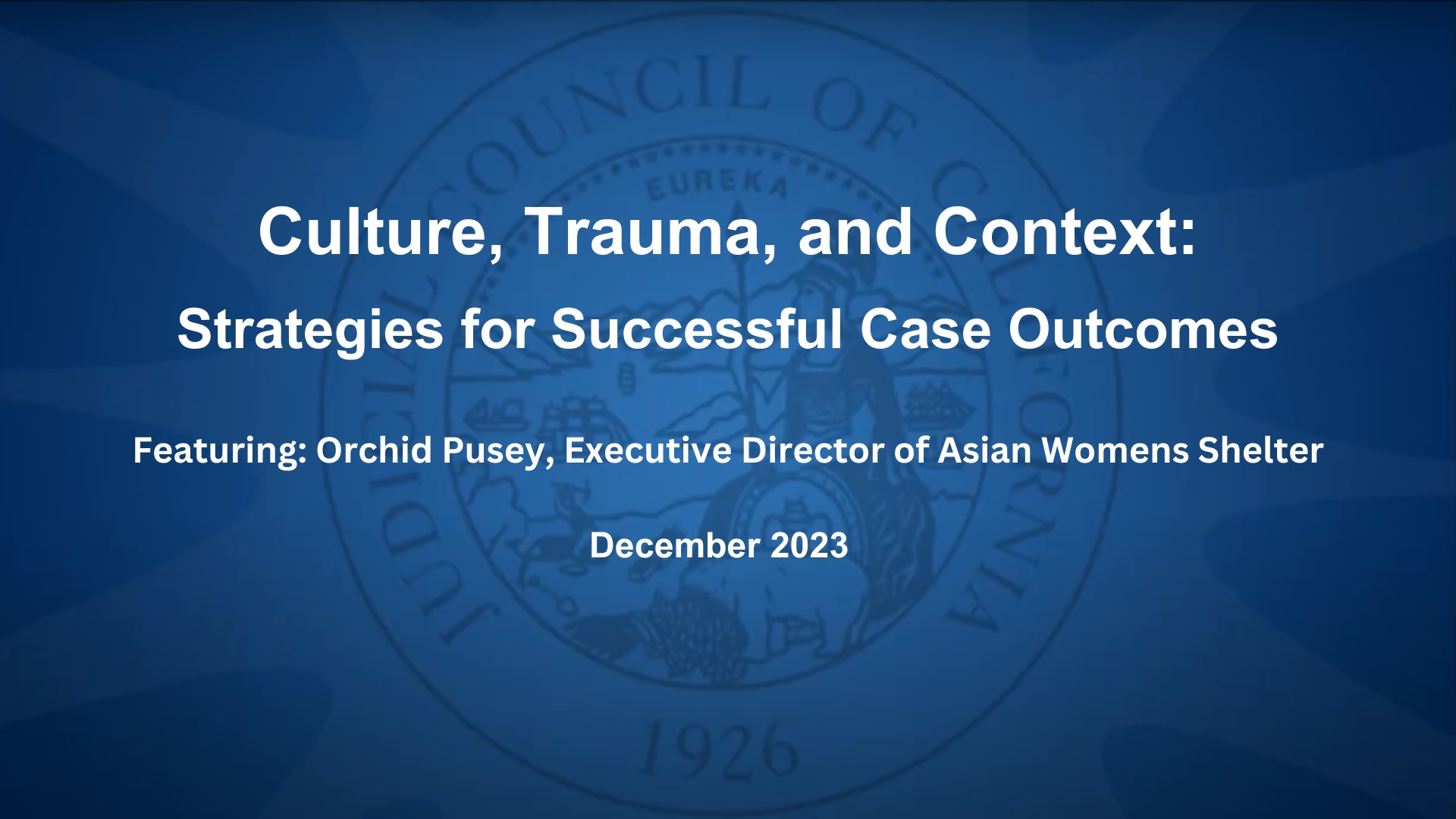 |
|
New! LGBTQIA+ Youth and Mental Health Webinar (40 Minutes) October 2023 The objective of this webinar is to explore the current landscape of LGBTQIA+ youth mental health and provide practical ways that court stakeholders can support LGBTQIA+ youth. As an accompaniment to the webinar, click here for a list of mental health resources for LGBTQIA+ youth. |
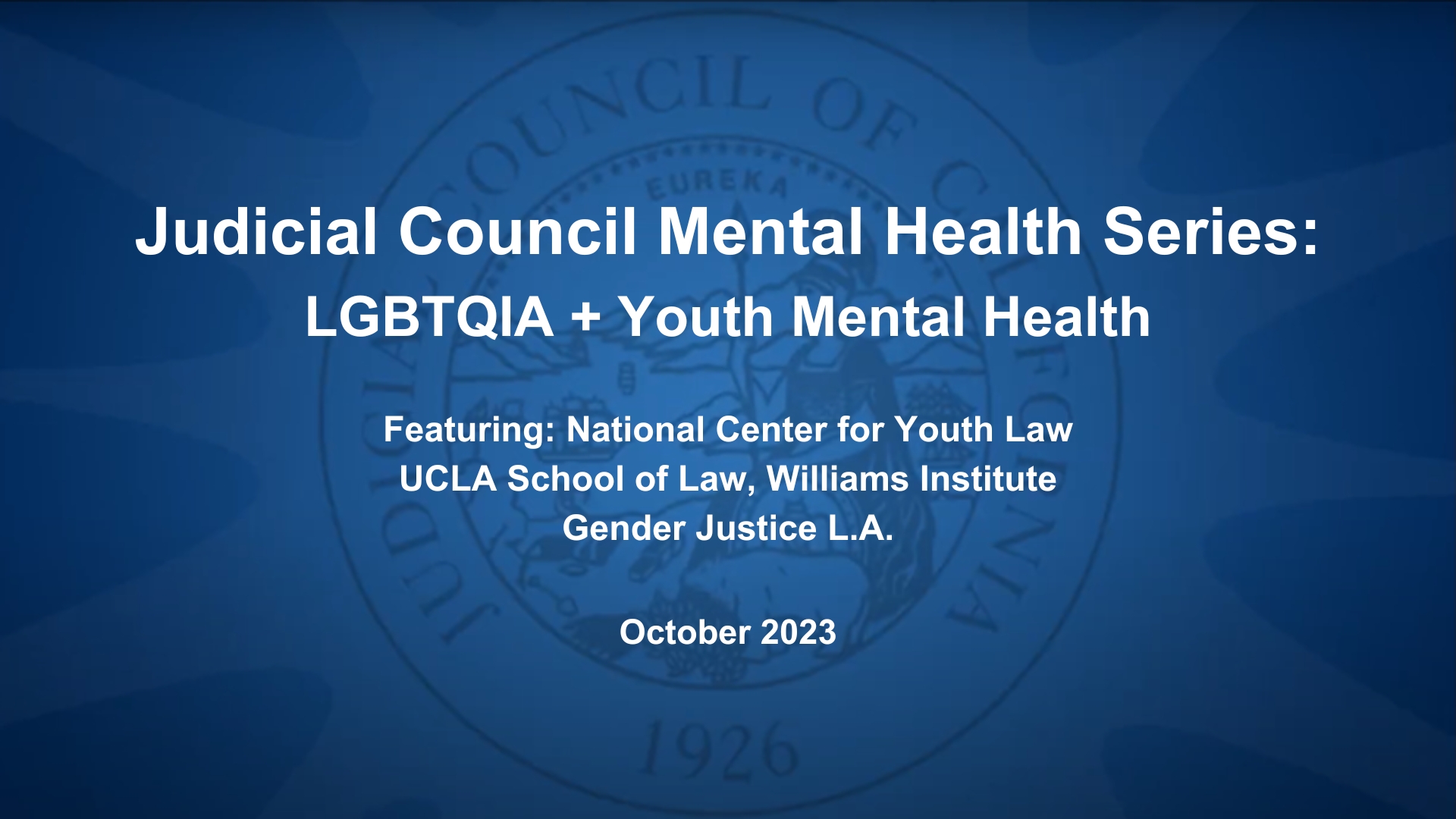 |
|
Race, Equity, and Mental Health (50 Minutes) February 2023 The objective of this webinar is to explore issues of racial equity and structural racism and their impact on children’s mental health and well-being. Join an engaging discussion with Dr. Rhea Boyd and Jevon Wilkes to better understand the impact of policing, the punishment pipeline, and youth mental health. |
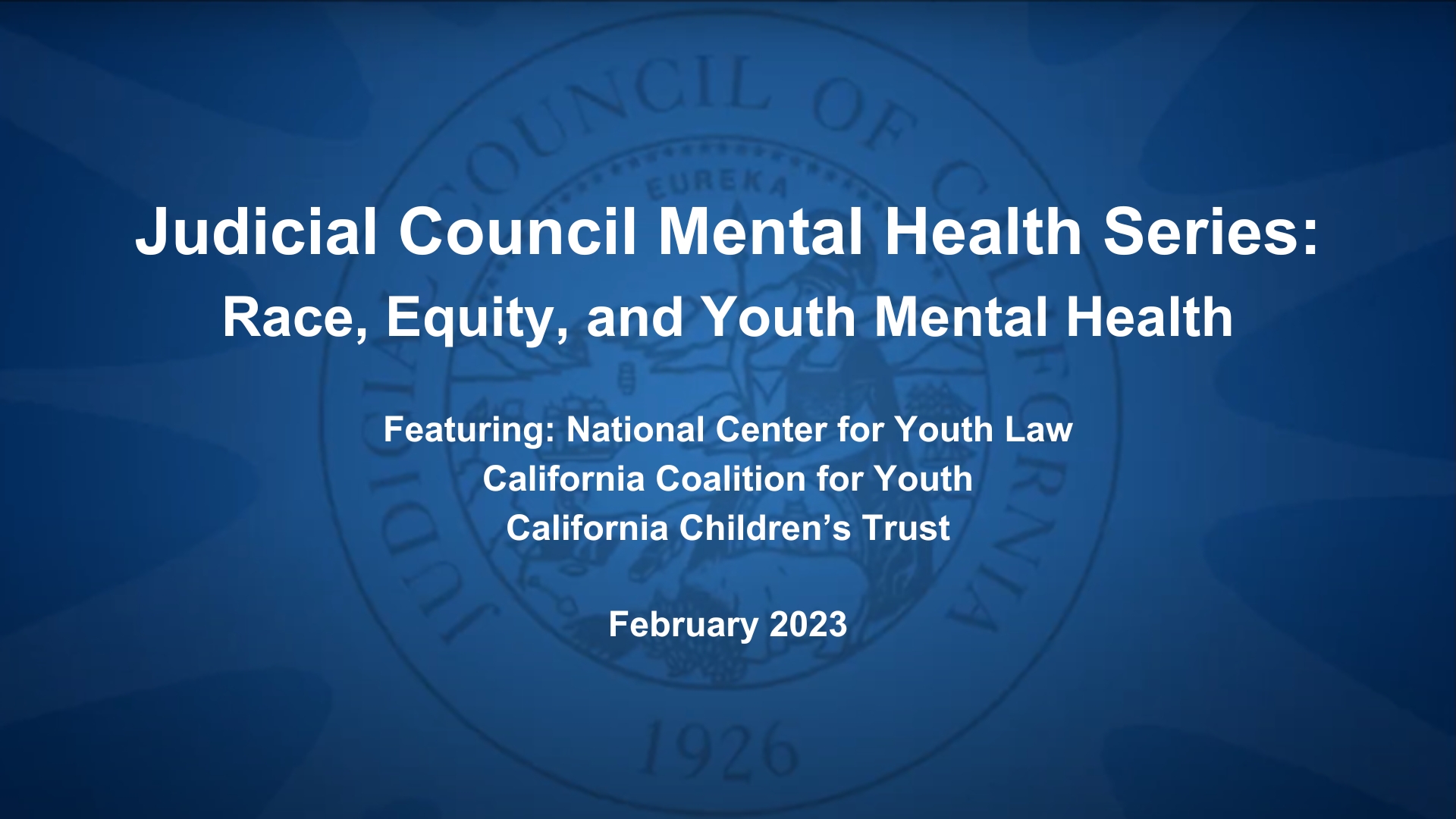 |
|
Getting Unstuck: Administering Outside the Lines (48 Minutes) May 2022 As weeks turn into months and months turn into years, we find ourselves caught between what was, what is, and what will be. The need to live in the present and power through uncommon exhaustion is a daily occurrence. How do we acknowledge and assess where we are within our management role? If we struggle to perform or question our efficacy, how do we become unstuck in order to grow and enhance our family court services teams? This session will take a pragmatic approach to mental health accountability and autonomous decision-making within court culture and infrastructure. |
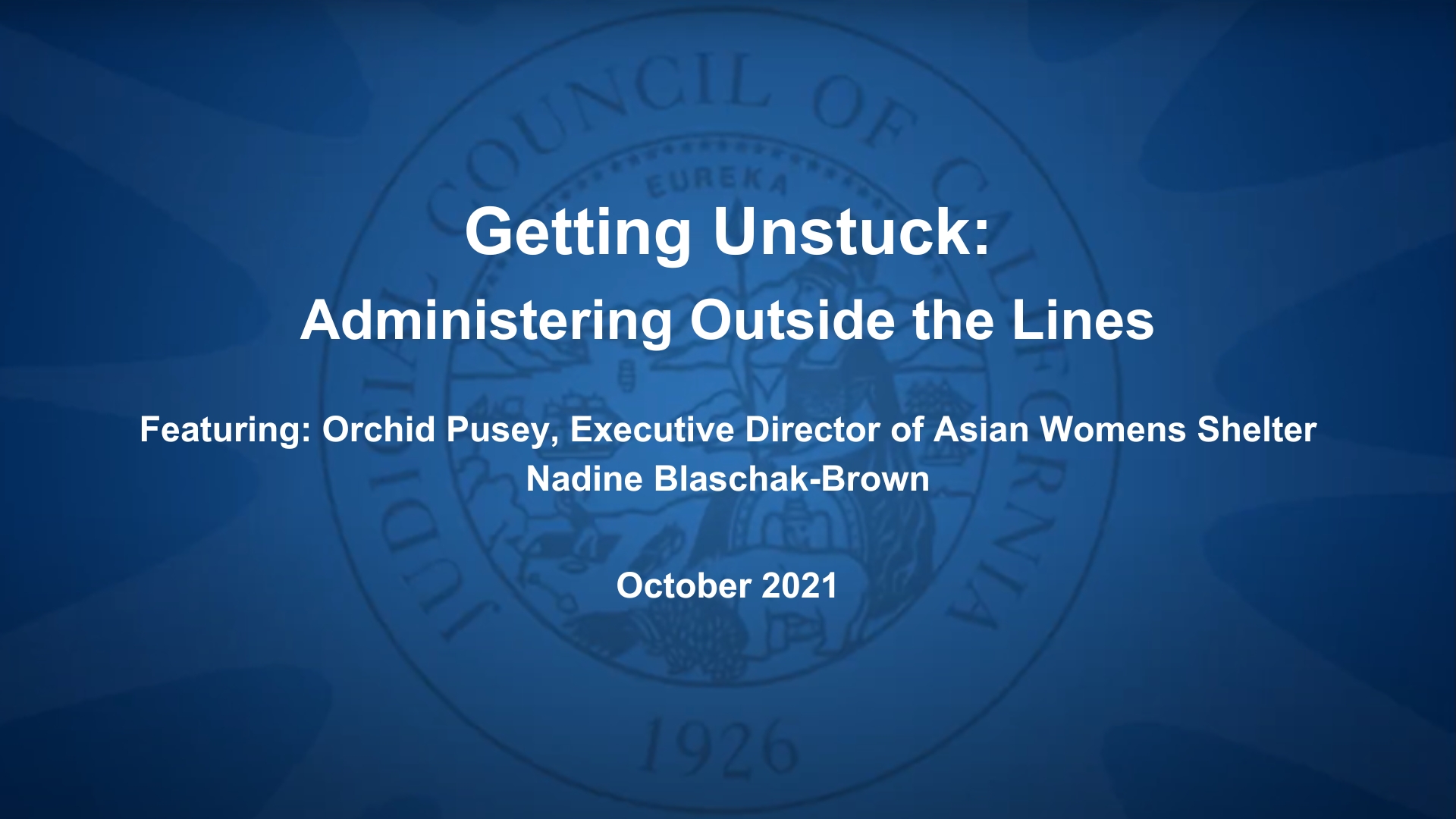 |
|
Contemplating Race, Access to Justice, and Equity (55 Minutes) October 2021 This webinar addresses how race and implicit bias can affect decisions and outcomes in the justice system. Participants will explore challenges and strategies illustrated through hypothetical situational exercises involving racial bias, perceptions of behaviors, and decision making. |
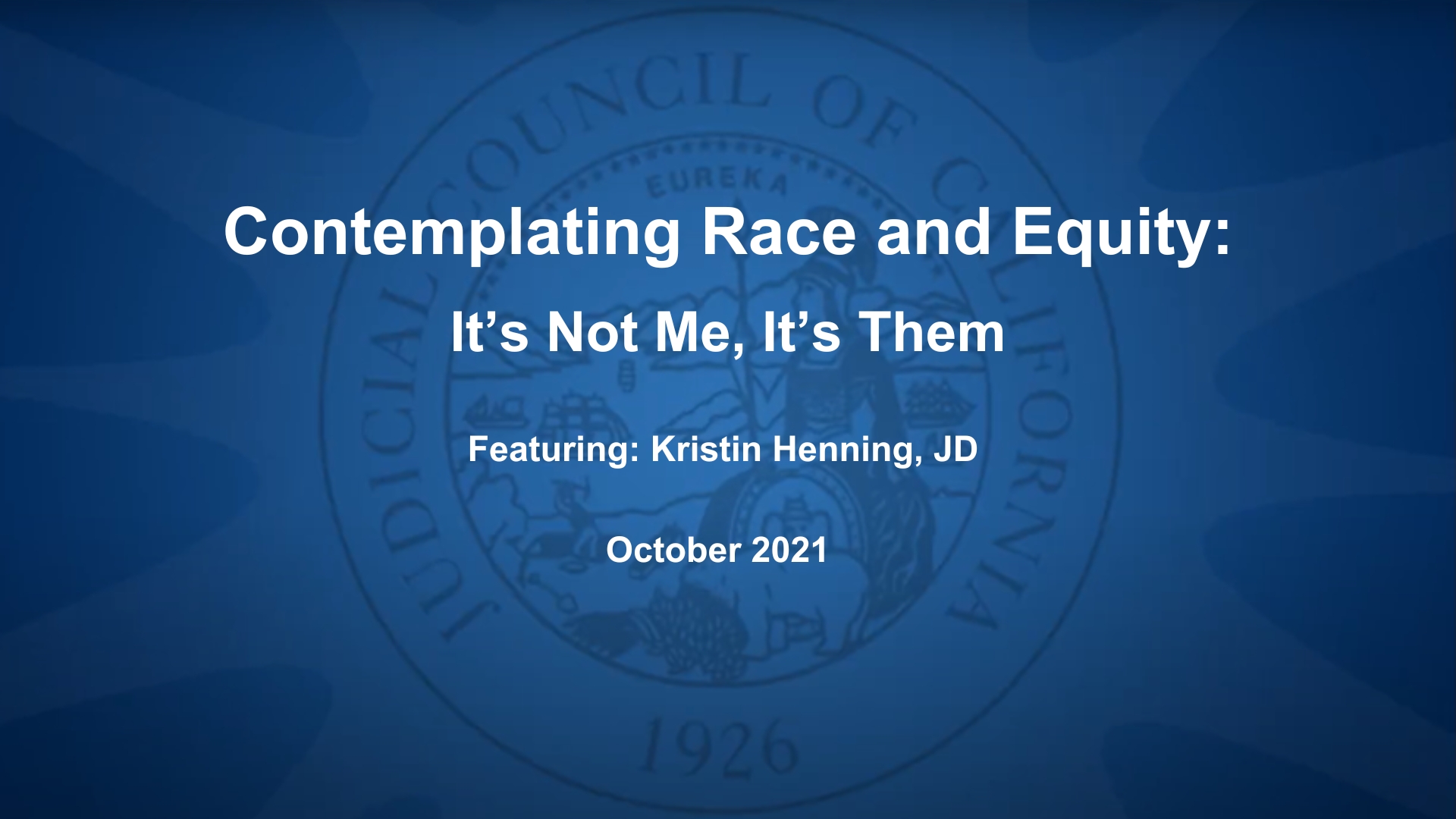 |
Effective Models and Approaches
|
New! Youth Mental Health: Substance Use and Harm Reduction Webinar (47 Minutes) January 2024 This webinar examines the circumstances, barriers, treatment, and solutions surrounding substance use needs among youth and the benefit of harm reduction principles, with a focus on opioid use disorder. Resource: Youth Mental Health: Substance Use and Harm Reduction Webinar: Key Takeways and Resources (PDF) |
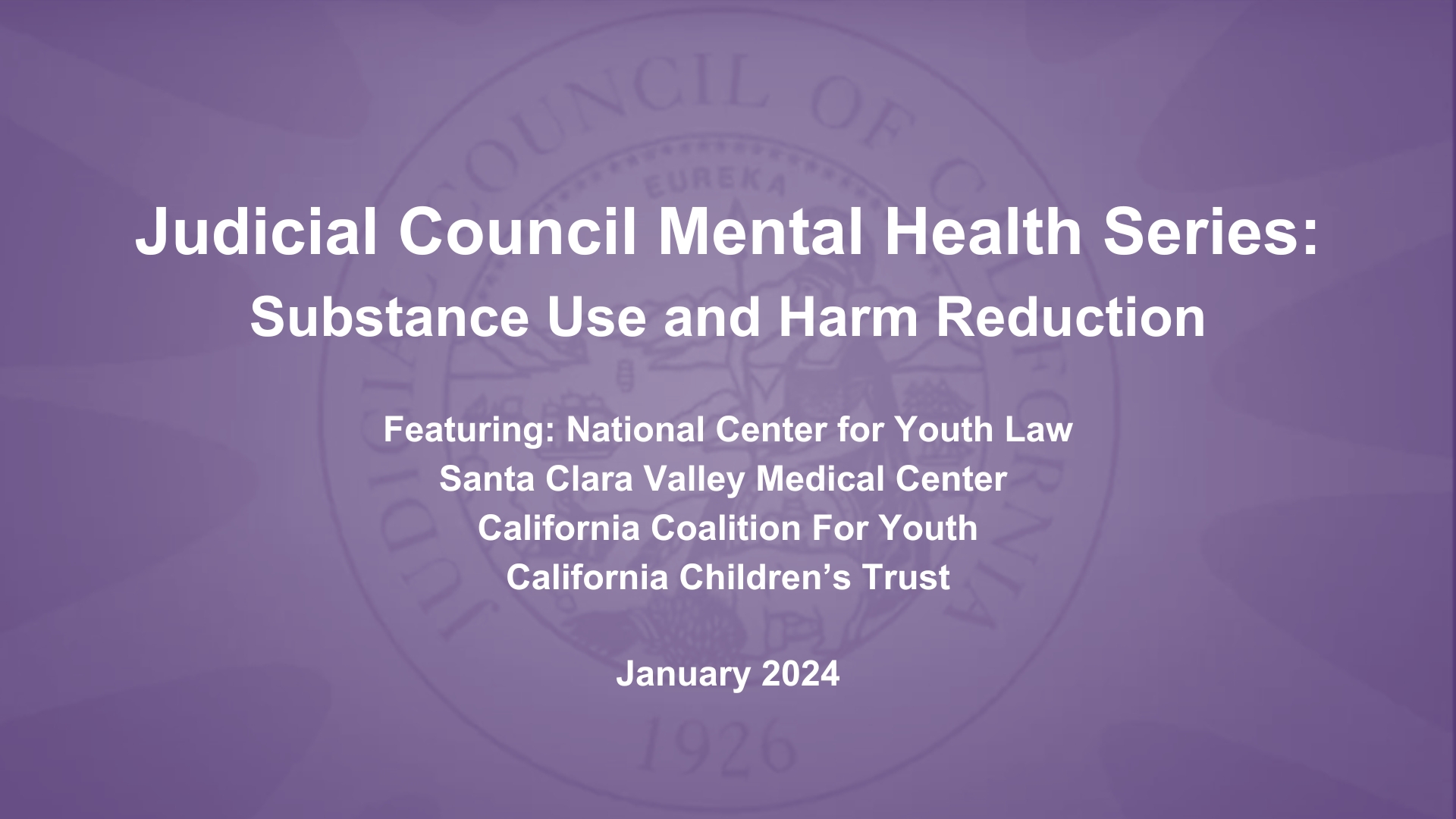 |
|
New! Elevating the Voices of Lived Experience Experts and Advocates Webinar (53 Minutes) October 2023 The objective of this webinar is to feature the voices of experts with lived experience. The training features discussions on topics including trauma, foster care, and strength-based strategies to assist court-involved youth. The presentation identifies key takeaways, strategies, and approaches provided by advocates who have been impacted by the court system as young people. As an accompaniment to the webinar, click for a list of resources, key takeaways and tips on how to support court involved youth. |
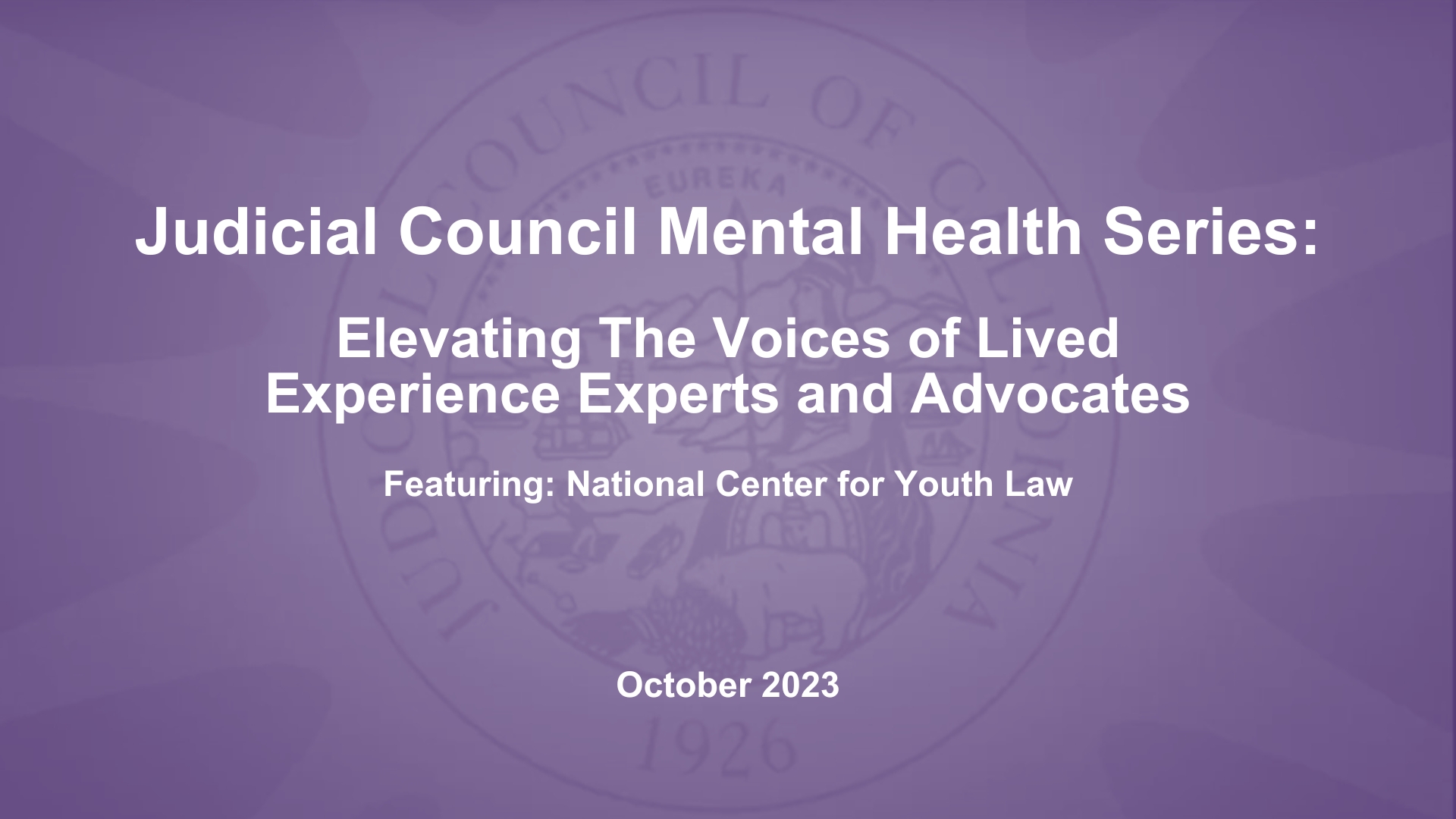 |
|
Improving Court Practices In Mental Health and Information-Sharing Webinar (55 Minutes) March 2023 Please join us to review the ethical, medical, and legal principles of confidentiality and privilege that apply to mental and behavioral health information and information sharing. We will apply the law to scenarios from different court settings and propose some best practices and recommended strategies for thinking about mental health confidentiality and information sharing in the courtroom from the perspective of promoting and centering mental health and wellbeing. |
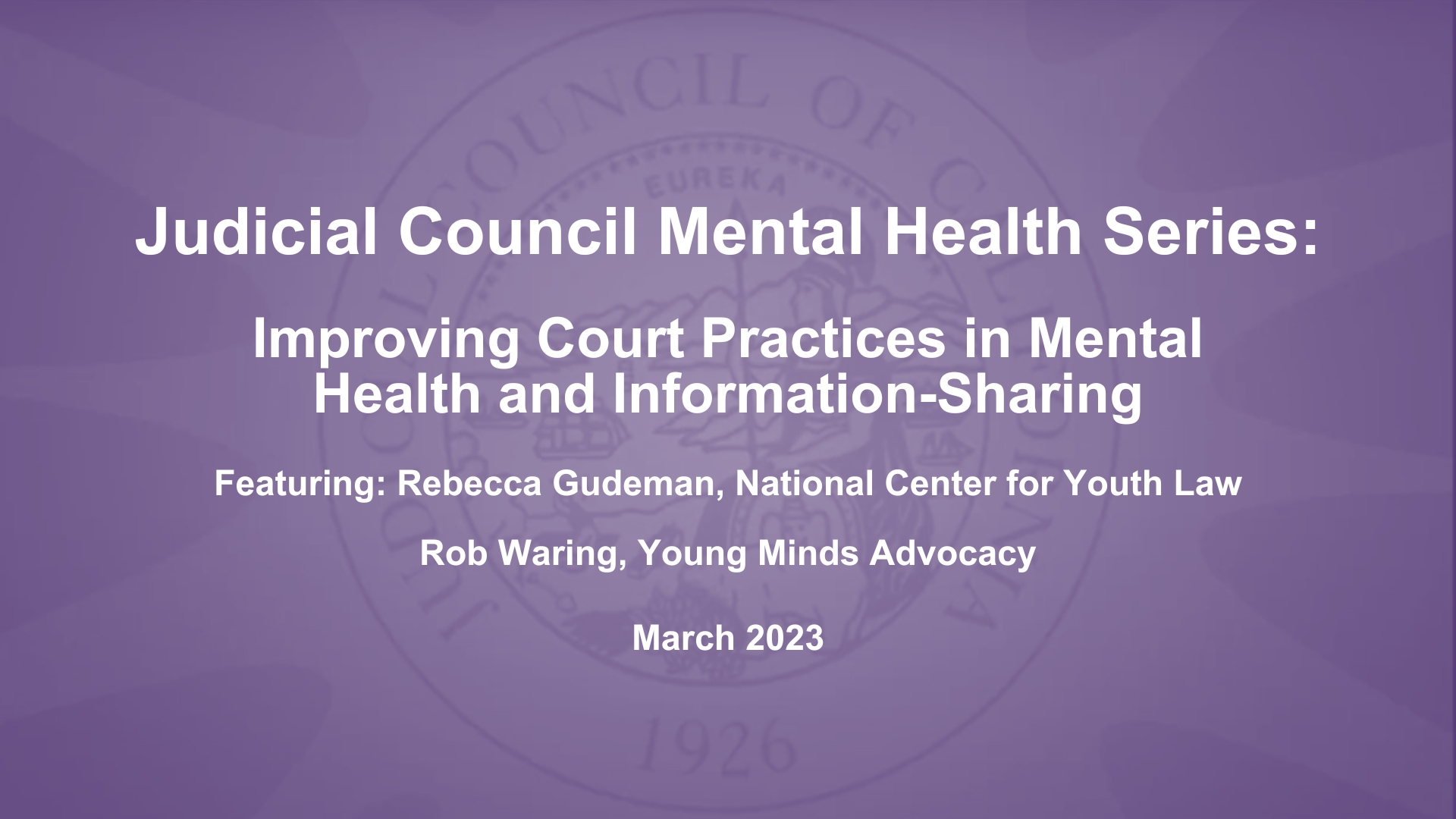 |
|
Tips and Tools: How to Work with, Understand, Support Youth Dealing with Mental Health Issues (42 Minutes) September 2022 This video explores techniques and culturally responsive approaches to engage with young people who may have behavioral health challenges (mental wellness or substance abuse.) |
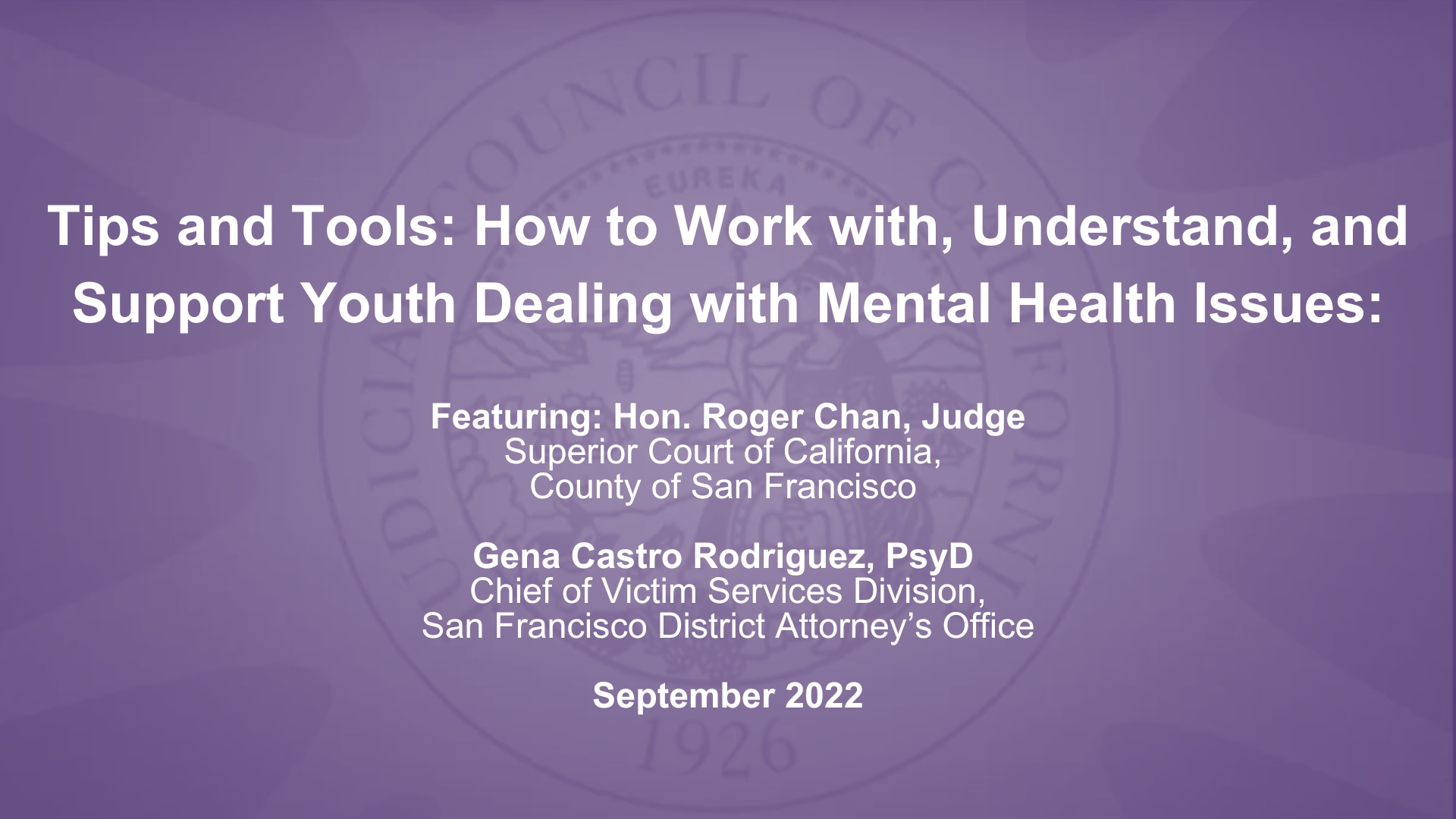 |
|
Tips and Tools on Juvenile Mental-Behavioral Health Panel Discussion (48 Minutes) September 2022 Panelists from Part 1 of the presentation address strategies for courts and their partners to better work with young people, especially in light of the additional challenges posed by the pandemic. |
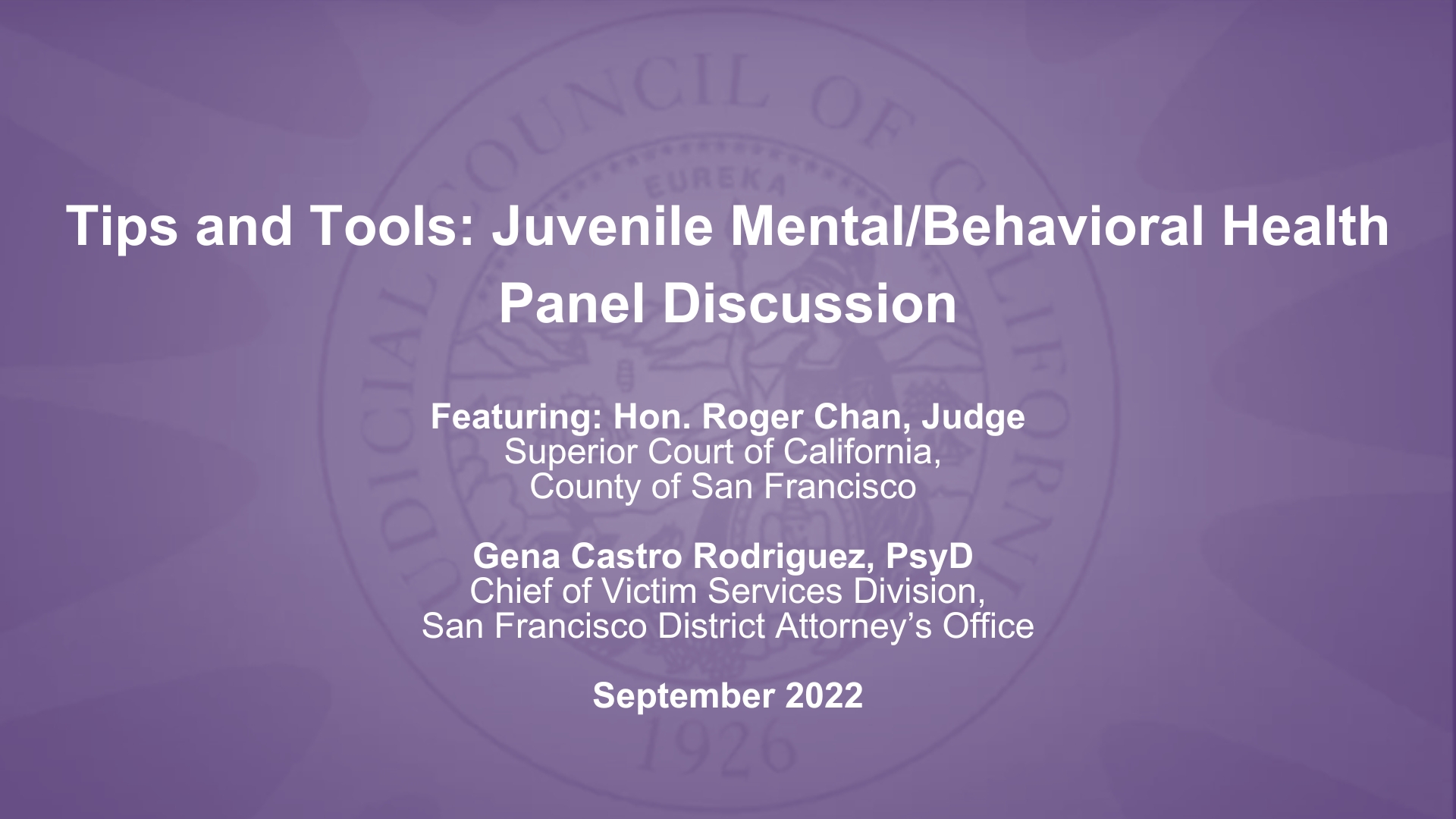 |
|
Psychotropic Medication and California’s Foster Youth (44 Minutes) June 2022 |
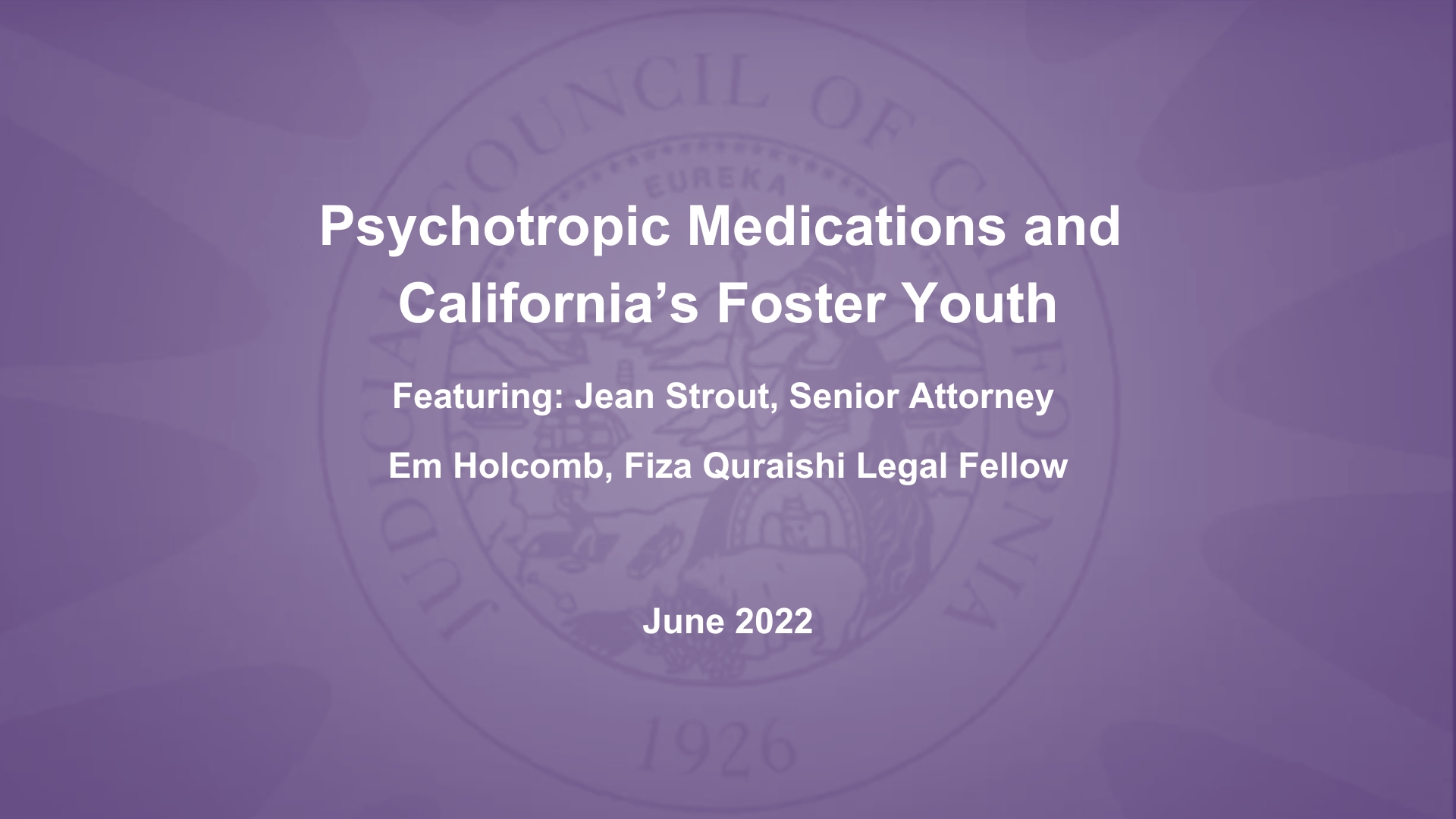 |
|
How Courts Can Support the Mental Health of Youth and Families (52 Minutes) April 2022 This webinar provides courts and justice partners with an understanding of the role that they can play in responding to mental health needs and advancing access to mental health care for court-involved youth and families. |
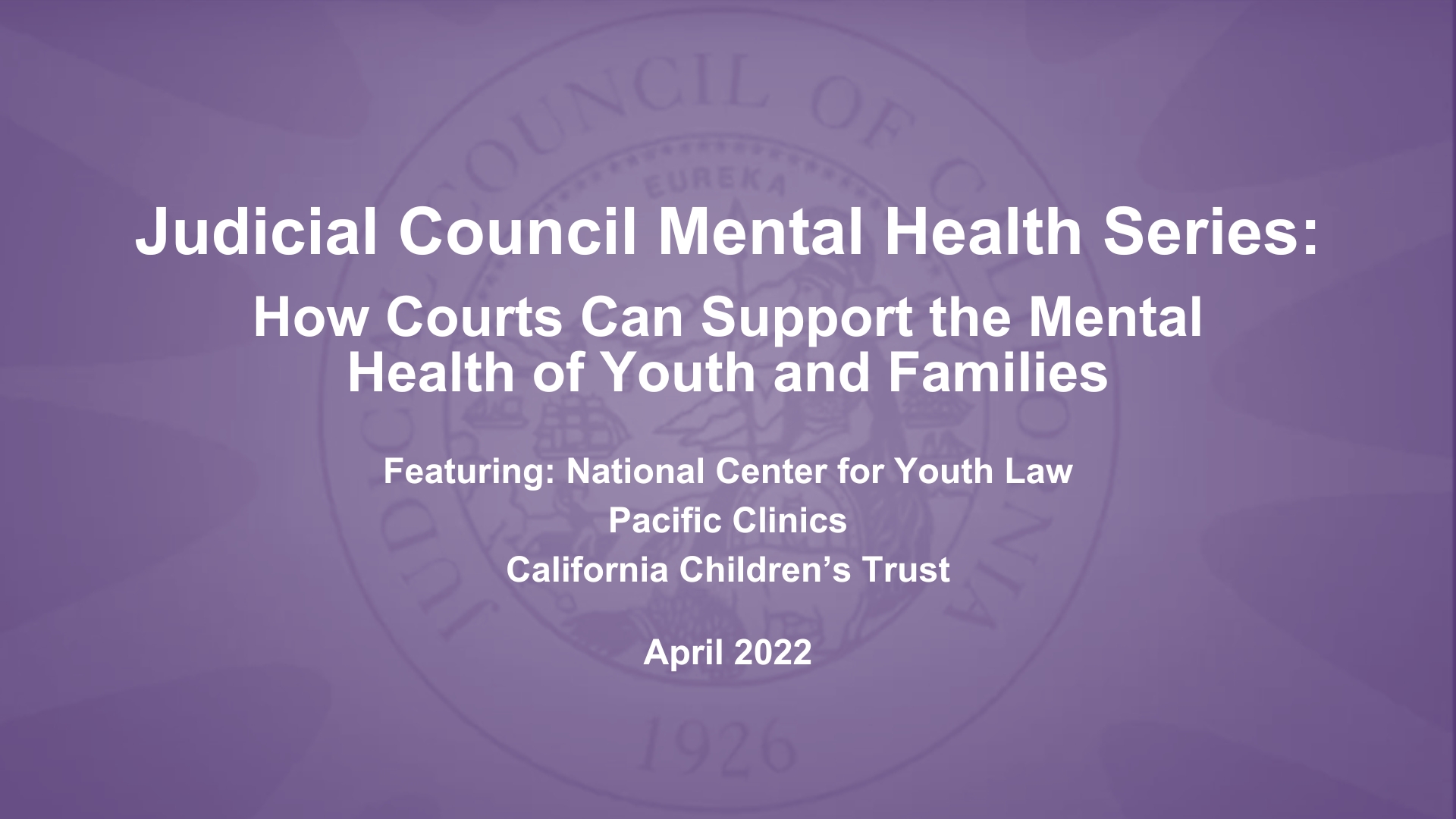 |
|
Judicial System Considerations for Youth with Autism Spectrum Disorder (67 Minutes) July 2021 This webinar provides information for courts and justice partners to consider when working with youth who have autism spectrum disorder. |
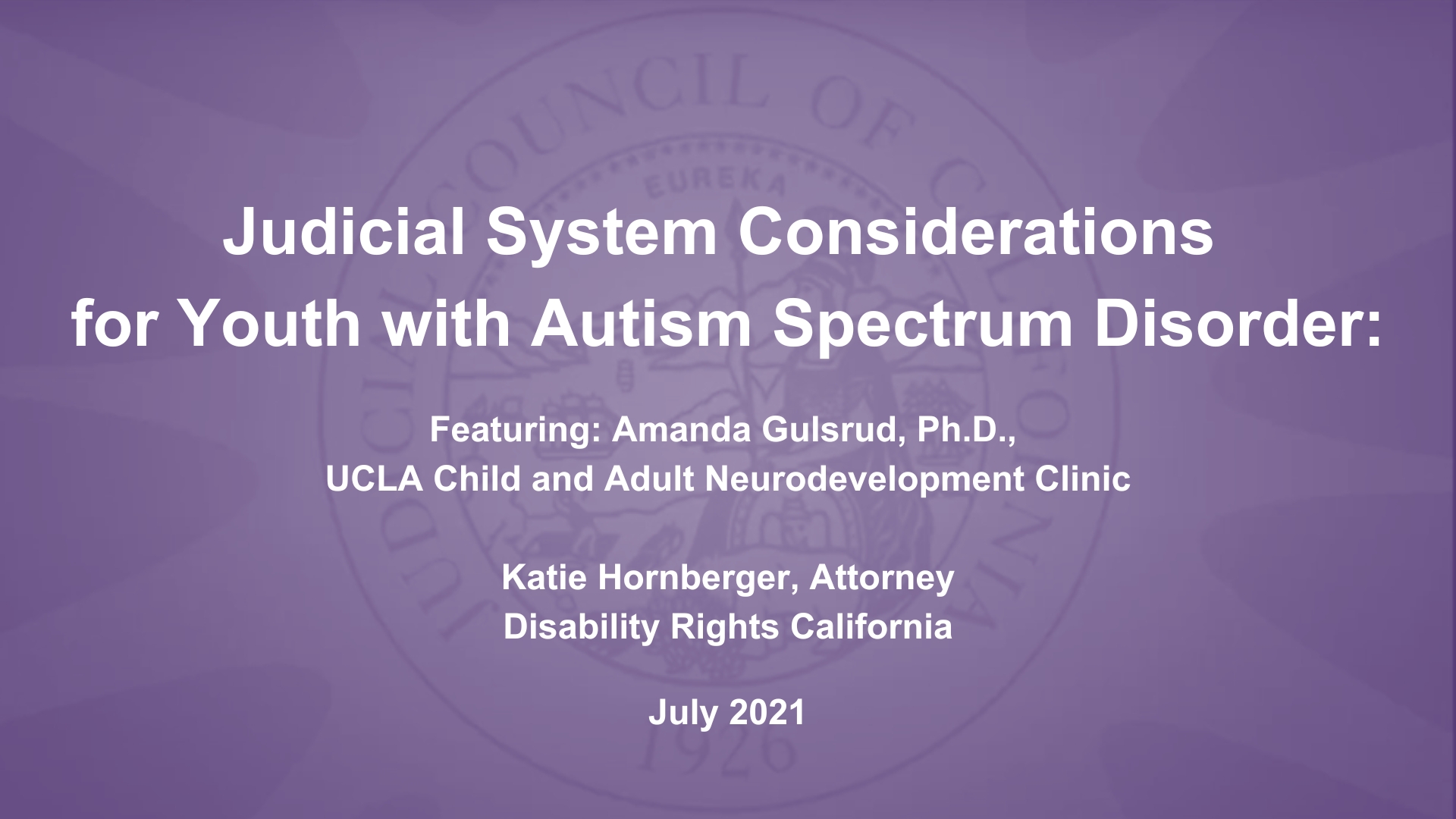 |
Mental Health Services: Key Programs and Funding
|
Identifying Needs and Gaps in Accessing Mental Health Care for System-Involved Youth (50 Minutes) November 2022 Examines the increased mental health challenges for system-involved youth and highlights models of care and funding sources to meet needs and gaps in youth mental health care. The presentation focuses on serving youth in the child welfare system, foster care, justice involved, special education, and homeless/marginally housed populations. |
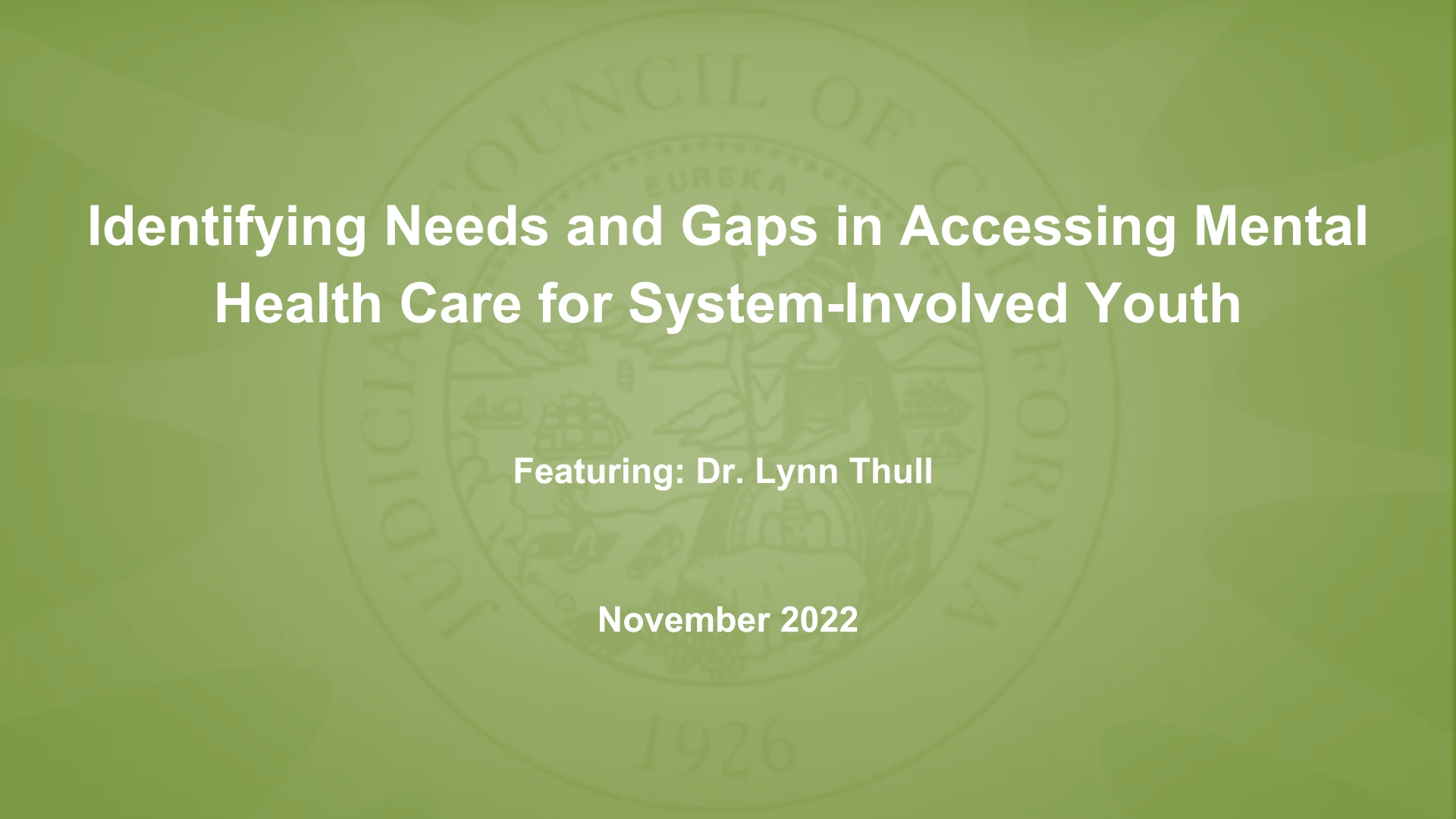 |
|
Ensuring Appropriate Service Provision for System-Involved Youth (56 Minutes) October 2022 This webinar covers the behavioral health needs of system-involved youth, the availability of behavioral health services, how to ensure appropriate service provision, the impact of SB 221 on service provision, how to enforce the right to access behavioral health, and other resources. |
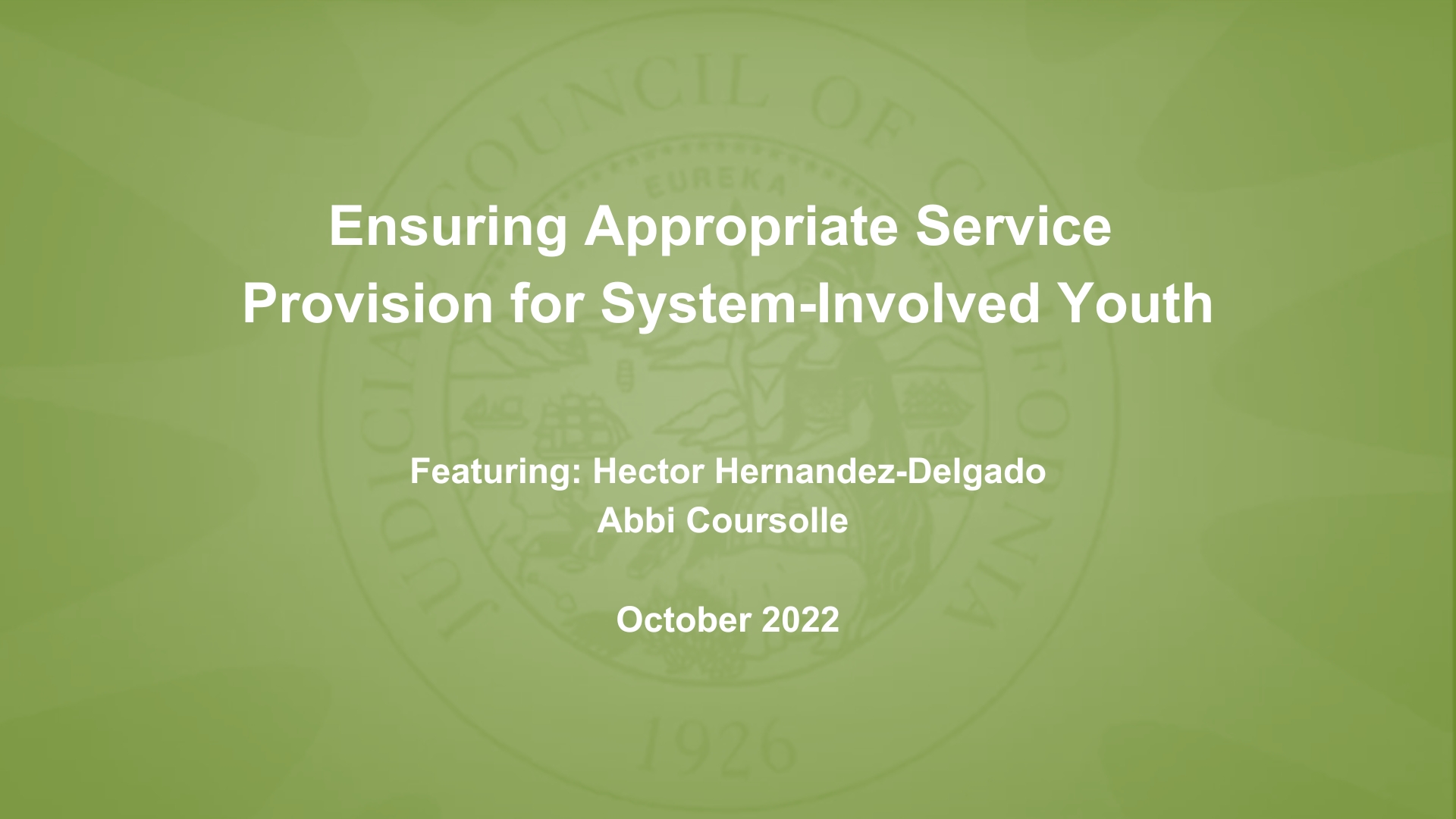 |
|
Connecting Court-Involved Families to Their Benefits (35 Minutes) August 2022 |
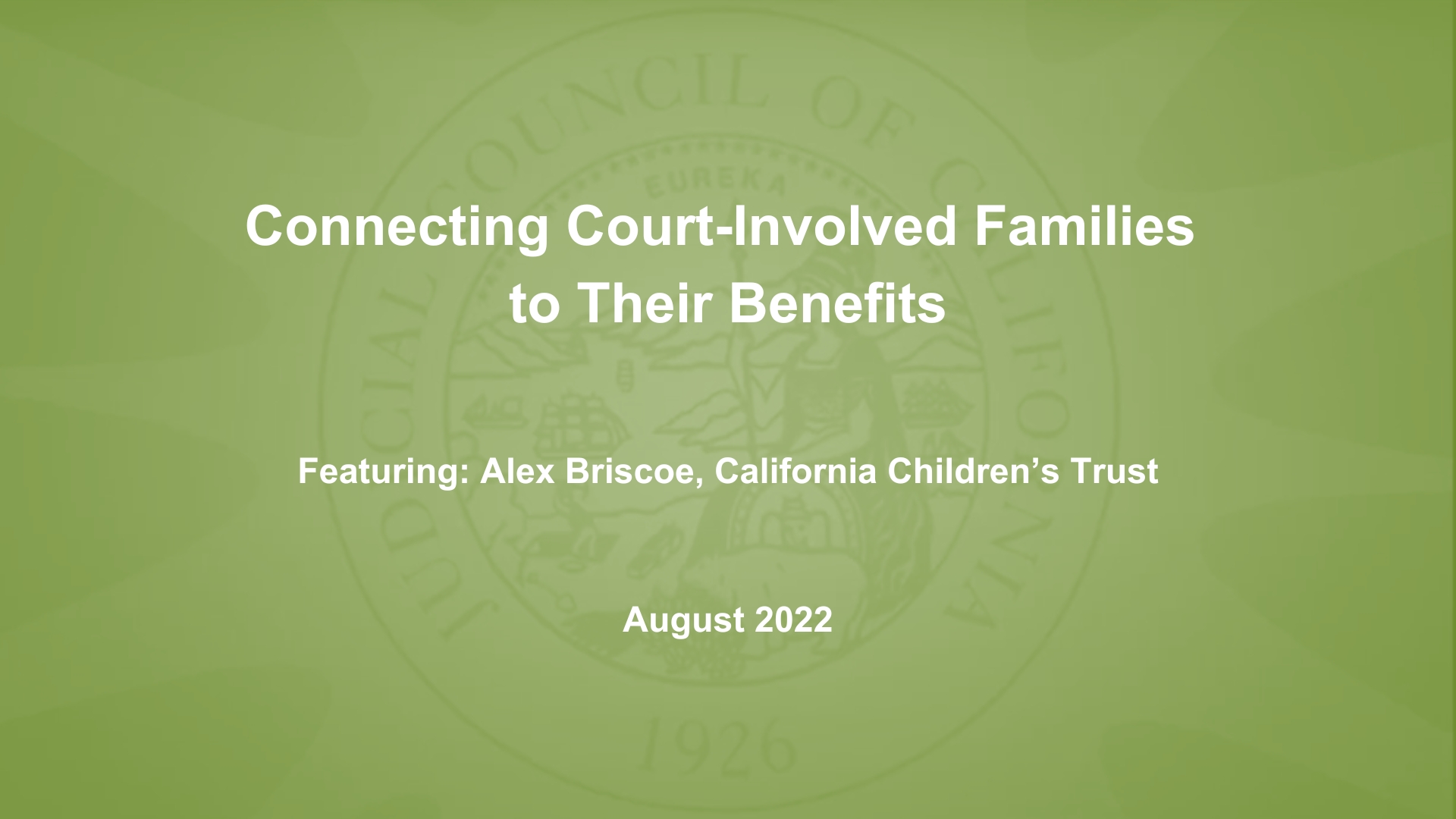 |
|
Understanding the Nuts and Bolts of Mental Health Care for Children and Families (58 Minutes) March 2022 This webinar offers an overview of the mental health needs, services, and supports available to children and families in California. Includes information about key programs and funding sources. |
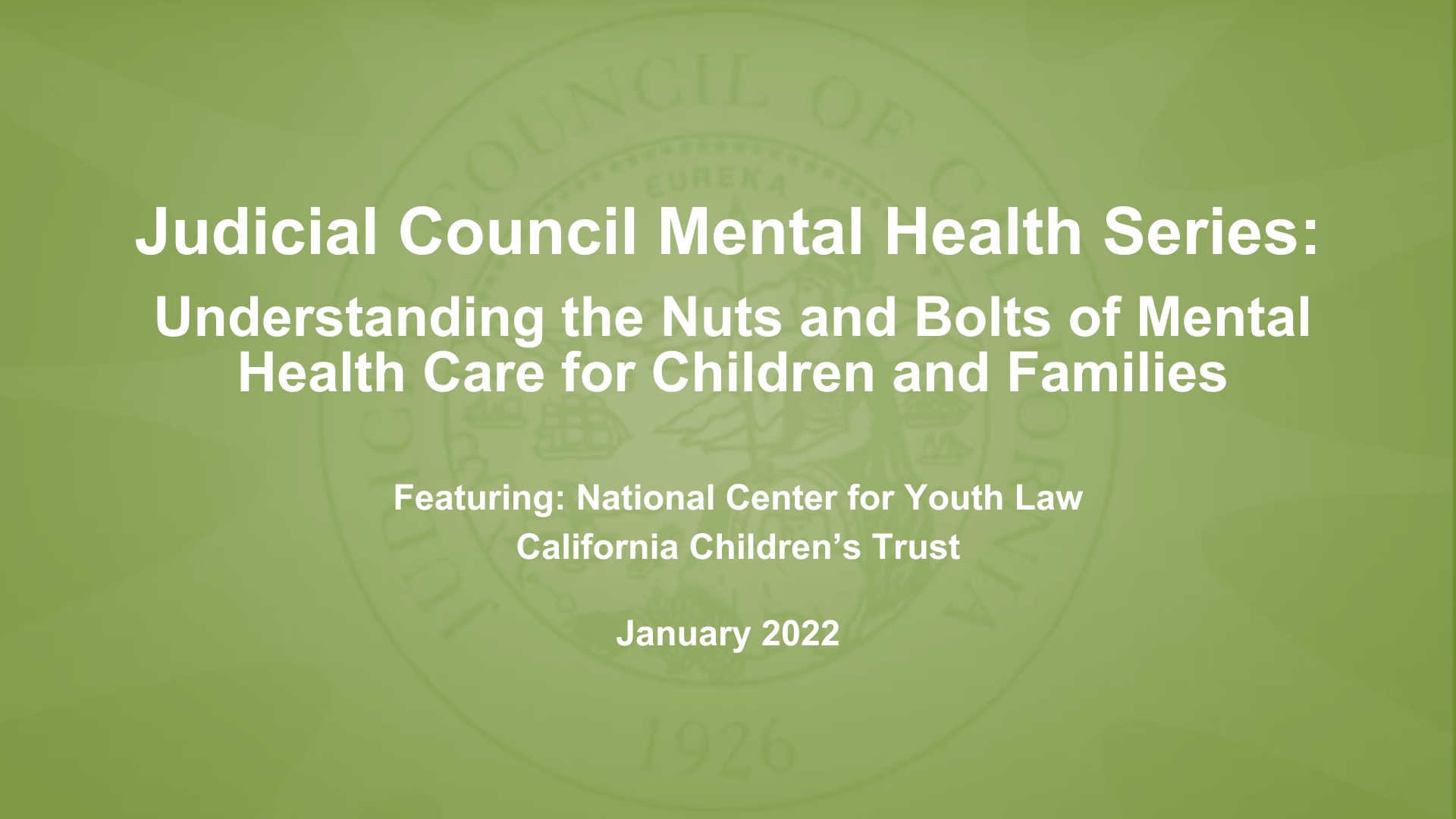 |
|
CalAIM and Juvenile Courts (60 Minutes) March 2022 This webinar focuses on the California Advancing and Innovating Medi-Cal (CalAIM) initiative, whose goal is to improve the quality of life and health outcomes of the Medi-Cal population by implementing broad delivery system, program, and payment reforms across the Medi-Cal program. This webinar’s panelists discuss how CalAIM will impact the juvenile justice community. |
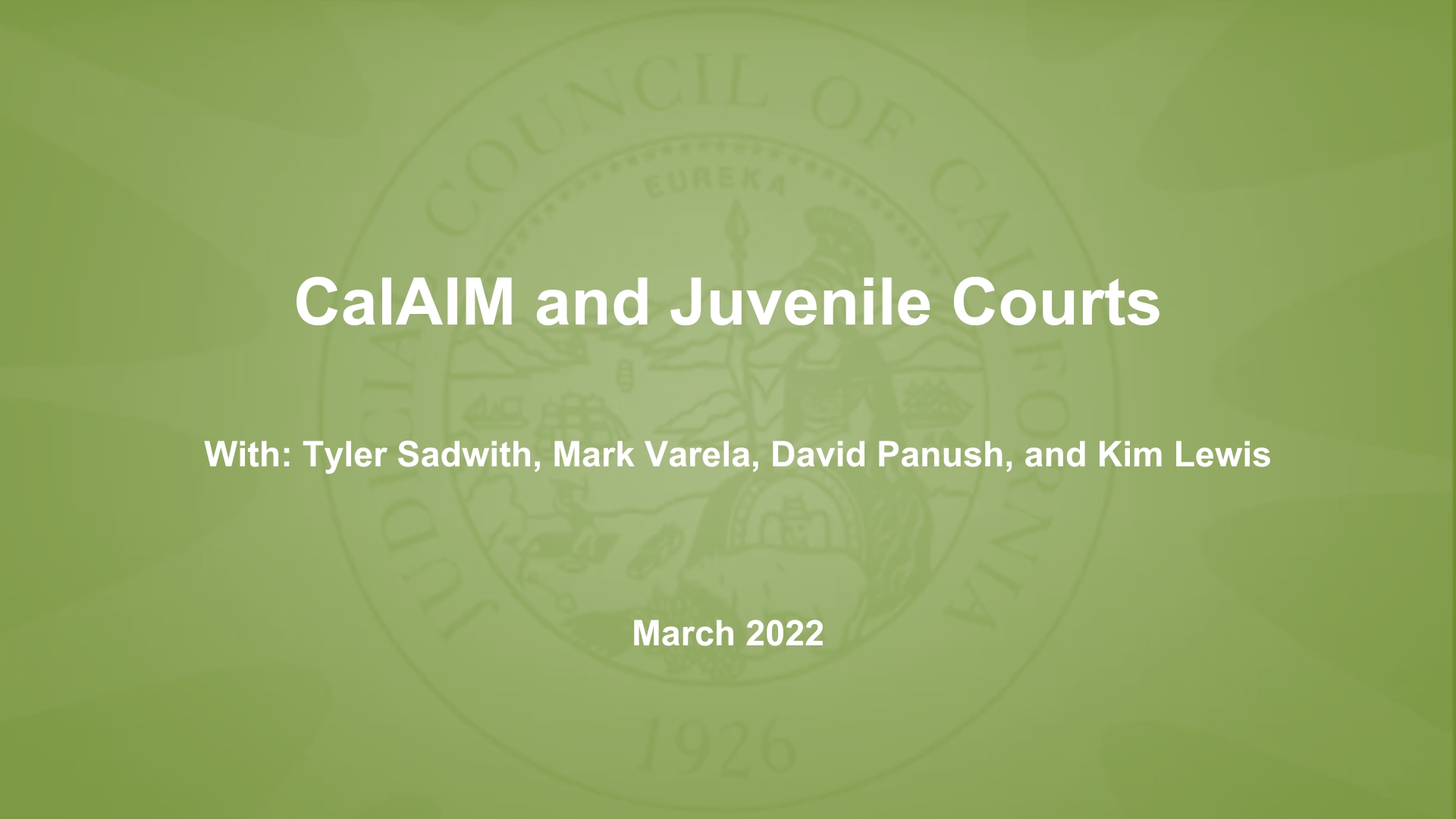 |
|
California’s Evolving Mental Health Care Landscape – What Courts Need to Know (54 Minutes) December 2021 This webinar provides an overview of ongoing efforts to reform and improve California's mental health care system, and how this may impact youth and families in California courts. |
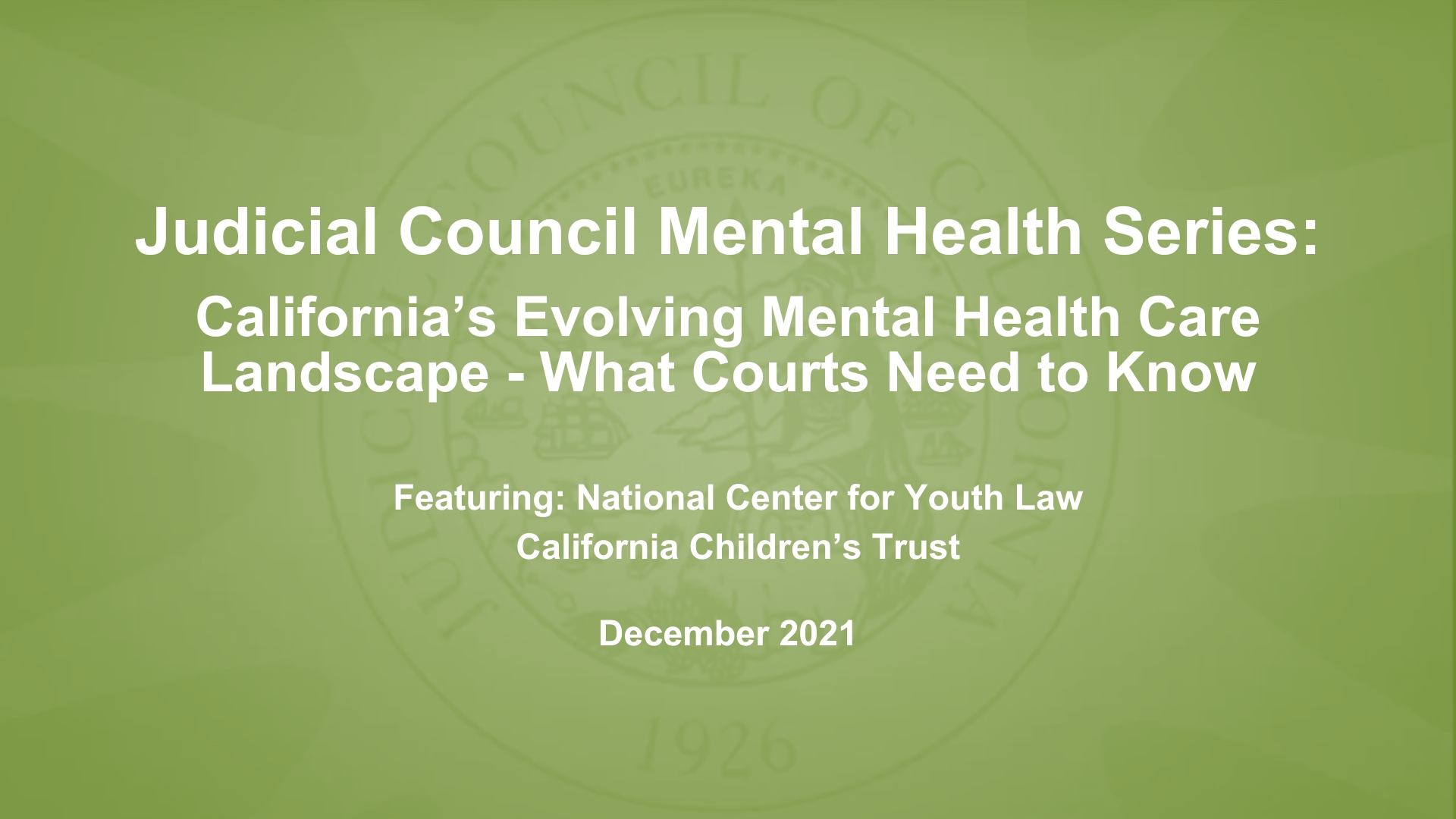 |
School-Based Mental Health Services and Support
|
School-Based Mental Health: A Clinical Perspective (49 Minutes) October 2022 Discussion on how to leverage school-based mental health services and the strength and challenges in the approach. The presentation explores the delivery of behavioral health services on the school site, common models, staffing of school-based behavioral health, information sharing, and frequently heard terms. |
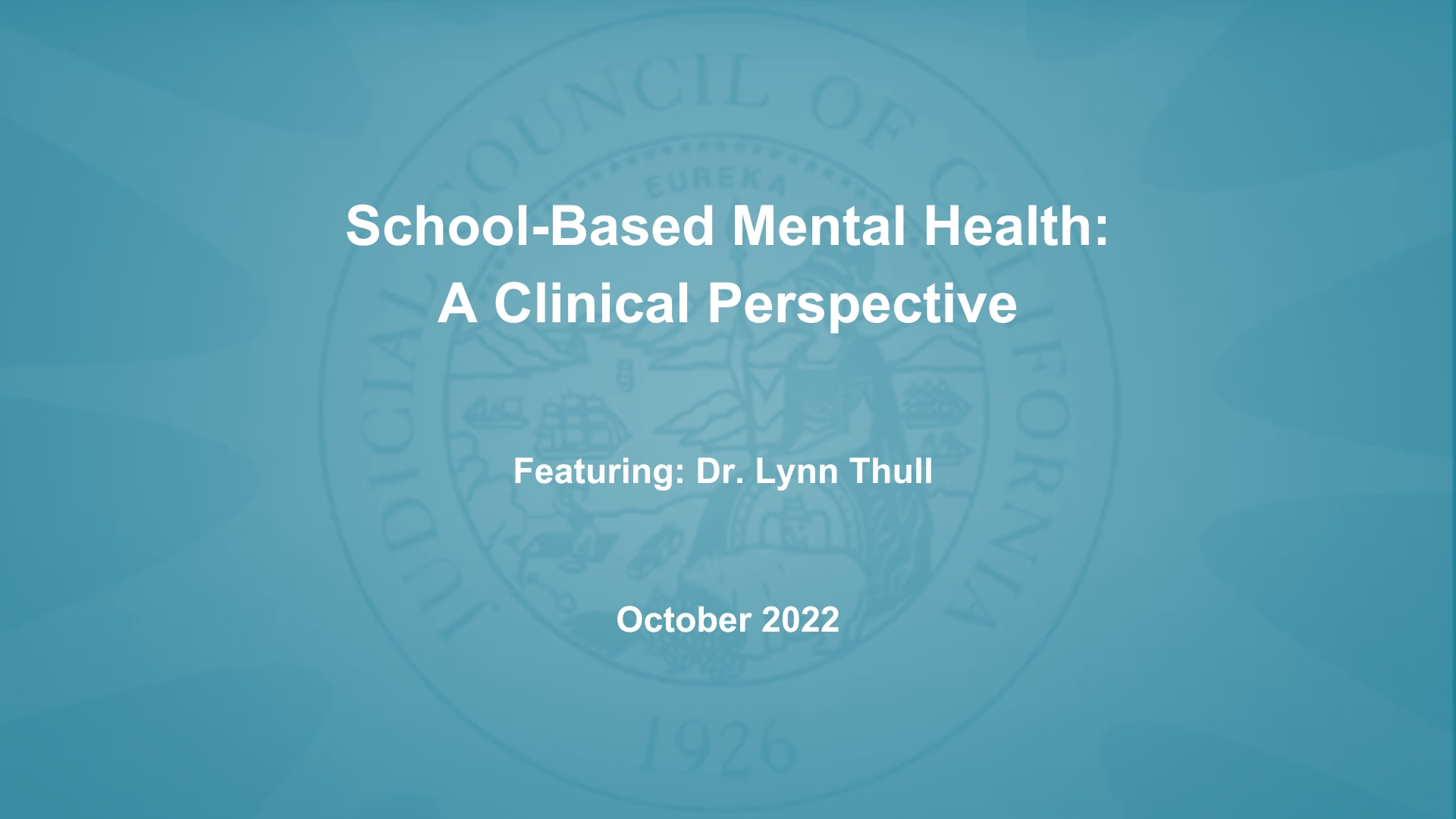 |
|
Primer on School-Based Mental Health Services, Support, and Care (46 Minutes) September 2022 This presentation by the California Children’s Trust focuses on the fundamental changes in the role of school-based support of mental and emotional health of youth. Topics include funding for school-based mental health services, California’s K-12 education system, school-linked mental health supports, and key takeaways. |
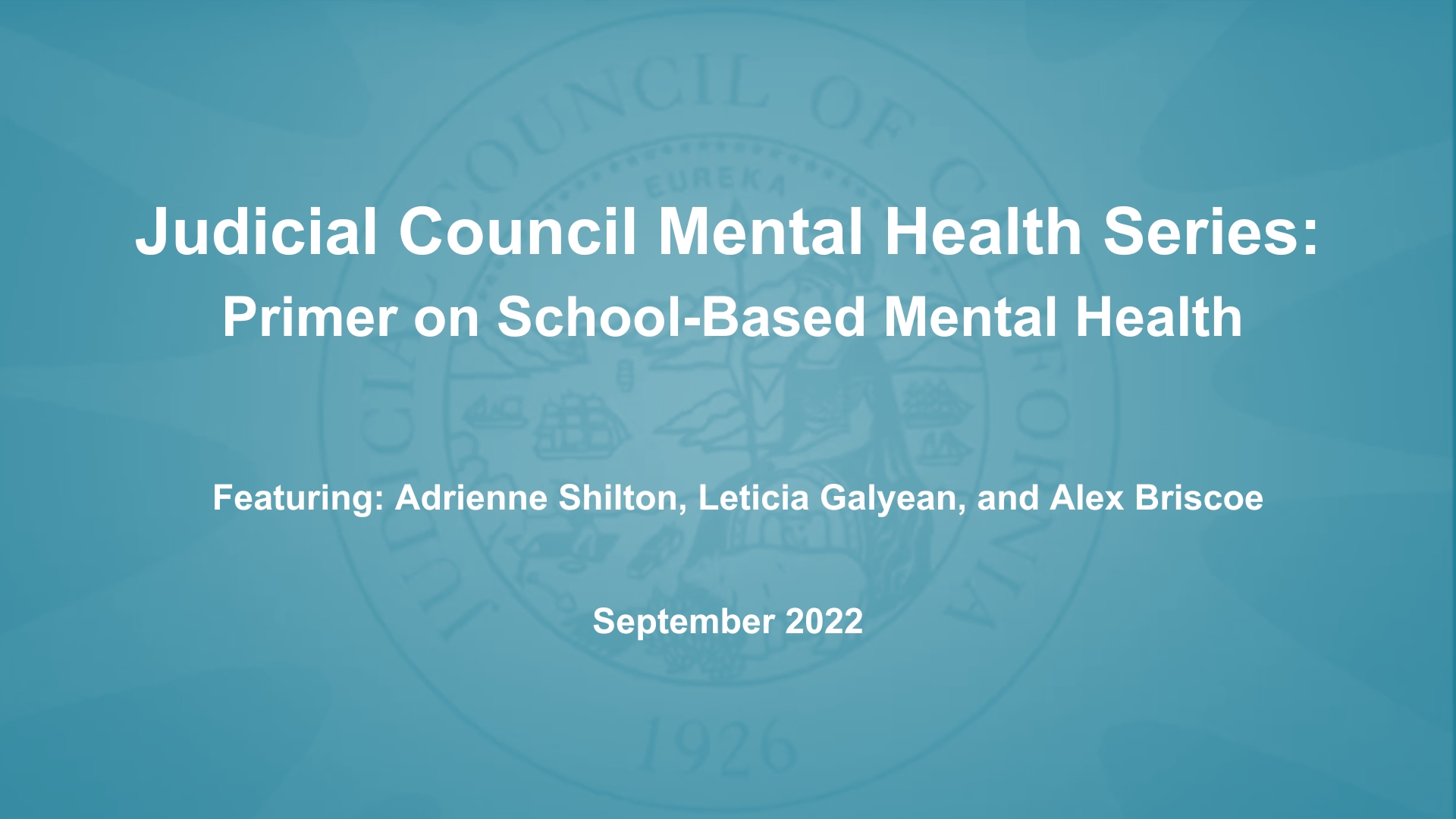 |
|
Targeted Mental Health and Substance Abuse Prevention and Early Intervention Through Schools (43 Minutes) August 2022 This webinar discusses why it’s important to implement services through school, what services are available in schools (with a focus on Medi-Cal), and how services are provided through schools, including how to identify local partners. Speakers Nancy Hsu of the National Health Law Program and Lisa Eisenberg of the California School-Based Health Alliance also discuss challenges that schools may face. View slides for this presentation with links. This is the first in a series of webinars related to service provision for system-involved youth. |
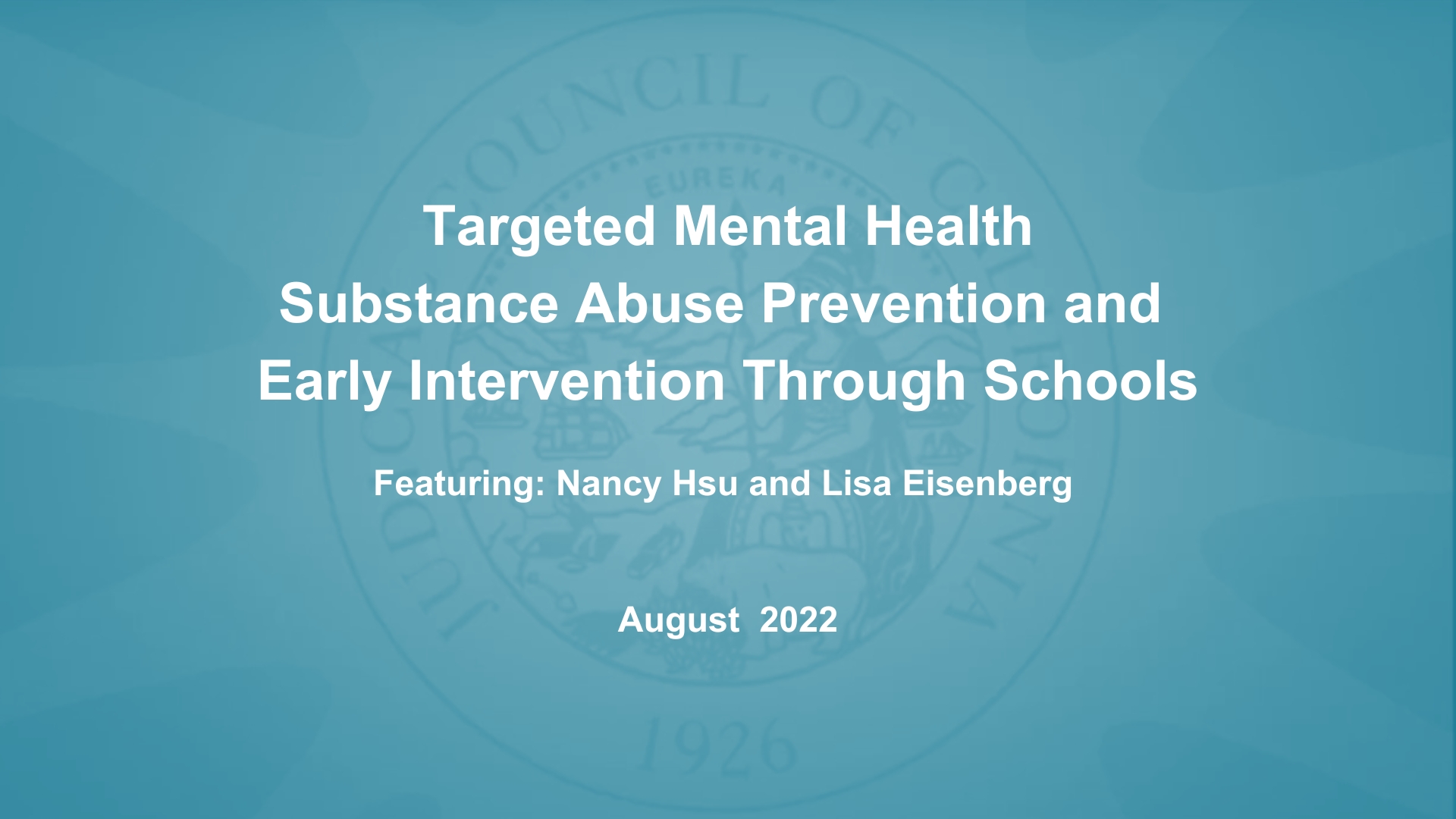 |
|
The Pandemic’s Impact on the Mental Health of Youth (62 Minutes) July 2022 Mental health challenges in children, adolescents, and young adults are real and widespread. The COVID-19 pandemic has altered their experiences at home, school, and in the community, and the effect on their mental health has been devastating. Join this presentation where we explore what the data is telling us and strategies to mitigate the impact of Covid including funding and resources available to courts and justice partners. |
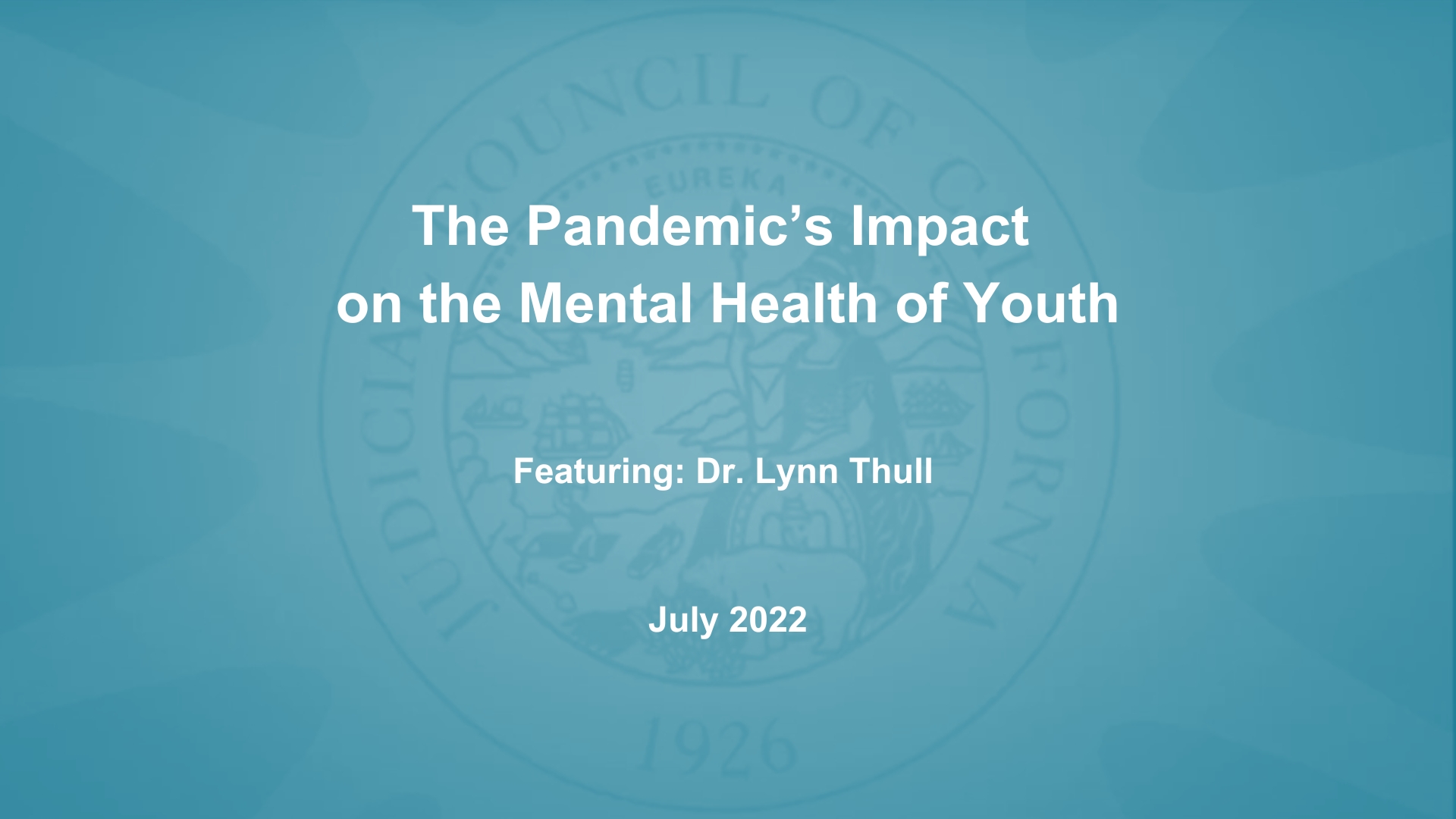 |
Special Projects for At-Risk Populations
- Family and Juvenile Mental Health Program staff are involved in initiatives to improve access and services to our youth and families.
- Foster Care Model of Care Workgroup (June 2020) was established to create a long-term plan for how children and youth in foster care receive health care services (physical health, mental health, substance use disorder treatment, social services, and oral health). The workgroup also will determine whether or not a new system of care should be developed.
